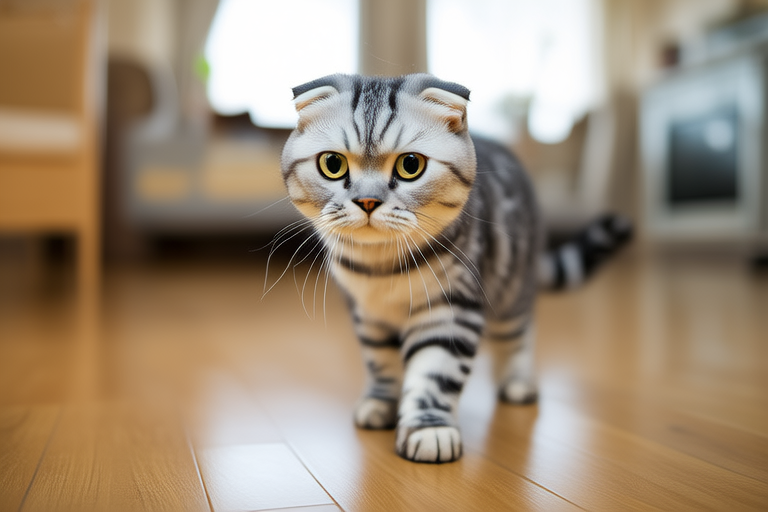Meet the Quirky Scottish Fold: A Breed Unlike Any Other!
The world of feline companionship is vast and varied, with each breed offering something unique and special. Among the myriad of breeds, one stands out as particularly charming and distinctive – the Scottish Fold. This breed is known for its unique physical characteristics, delightful personality, and rich history. Let’s delve into the world of the Scottish Fold and discover why they are a breed unlike any other.
A Brief History of the Scottish Fold
The story of the Scottish Fold begins in Scotland, where in 1961, a shepherd cat named Susie was born with a natural genetic mutation that caused her ears to fold forward. Her owner, William Ross, noticed the uniqueness of these ears and decided to breed Susie with a British Shorthair. The result was a litter of kittens, some of which inherited the folded ear trait. These cats became the foundation for what would later be known as the Scottish Fold.
Despite their origins in Scotland, the breed faced challenges in gaining recognition. In fact, it wasn’t until 1978 that the Cat Fanciers’ Association (CFA) granted the Scottish Fold championship status. Today, the breed is recognized by many major cat registries worldwide, including the International Cat Association (TICA).
Distinctive Physical Traits
One of the most striking features of the Scottish Fold is their folded ears. This genetic mutation causes the cartilage in the ear to fold forward and down, giving them a distinctive appearance. Not all Scottish Folds have folded ears; some kittens are born with straight ears and are known as ‘straight-eared’ or ‘single-eared.’ However, both types share the same genetic makeup, and straight-eared kittens can still produce folded-eared offspring.
Besides their ears, Scottish Folds have round faces, large eyes, and compact bodies. Their fur can come in various colors and patterns, though white is common. Their medium-sized bodies are muscular and well-proportioned, making them agile and playful despite their stocky appearance.
Social Behavior and Temperament
Scottish Folds are known for their friendly and sociable nature. They enjoy being around people and often form strong bonds with their human families. These cats are generally good with children and other pets, making them ideal for households with multiple family members or animals.
One of the quirkiest aspects of their personality is their curiosity. Scottish Folds love to explore and investigate their surroundings, often leading to amusing antics. They are also known for their ability to adapt to different environments, whether it’s a bustling household or a quiet apartment. Their adaptability makes them excellent companions for people with busy lifestyles.
Grooming Needs
While Scottish Folds are generally low-maintenance when it comes to grooming, they still require regular care to keep their coats healthy and shiny. Their short to medium-length fur requires weekly brushing to prevent matting and remove loose hair. During shedding seasons, more frequent brushing may be necessary.
In addition to coat care, it’s important to maintain their ear hygiene. The folded ears can trap dirt and debris, so gentle cleaning with a damp cloth is recommended. Regular nail trimming and dental care are also essential to ensure overall health.
Health Considerations
Like all breeds, Scottish Folds are prone to certain health issues. One of the most significant concerns is osteochondrodysplasia, a condition that affects the development of bones and cartilage. This condition can lead to joint problems, especially in the tail, legs, and spine. Responsible breeding practices are crucial to minimize the risk of this condition.
Other health issues that can affect Scottish Folds include heart disease, obesity, and respiratory problems due to their flat faces. Regular veterinary check-ups and a balanced diet can help manage these conditions. Early detection and proper care can significantly improve their quality of life.
Common Misconceptions
There are several misconceptions about Scottish Folds that need addressing. One common myth is that all Scottish Folds will develop serious health issues. While it’s true that some health problems are associated with the breed, responsible breeding can greatly reduce the risks. Selecting a reputable breeder who prioritizes the health and well-being of their cats is crucial.
Another misconception is that Scottish Folds should only be kept indoors. While indoor living can protect them from outdoor dangers, it’s important to provide them with stimulating environments to prevent boredom and obesity. Interactive toys, scratching posts, and climbing structures can help keep them active and entertained.
Anecdotes and Stories
Many Scottish Fold owners have shared stories that highlight the breed’s quirky personality. One such story involves a Scottish Fold named Whiskers who had a peculiar habit of hiding in the most unexpected places. His owner, Sarah, often found him nestled inside a shoebox or behind the curtains. Whiskers’ love for hiding spots brought endless amusement to the household.
Another owner, Tom, shared a tale of his Scottish Fold, Luna, who developed a fascination with playing fetch. Despite not being a typical cat activity, Luna loved chasing after small toys and bringing them back. This playful behavior demonstrated the breed’s versatility and willingness to engage in different activities.
Conclusion
The Scottish Fold is a breed like no other, with its unique folded ears, friendly temperament, and quirky personality. From their origins in Scotland to their growing popularity worldwide, these cats have captured the hearts of many. Whether you’re a seasoned cat lover or considering adding a feline companion to your family, the Scottish Fold offers a delightful and rewarding experience.
Remember, while they bring joy and companionship, it’s important to choose a reputable breeder and provide them with the care they need. With proper attention and love, a Scottish Fold can become a cherished member of your household for years to come.
